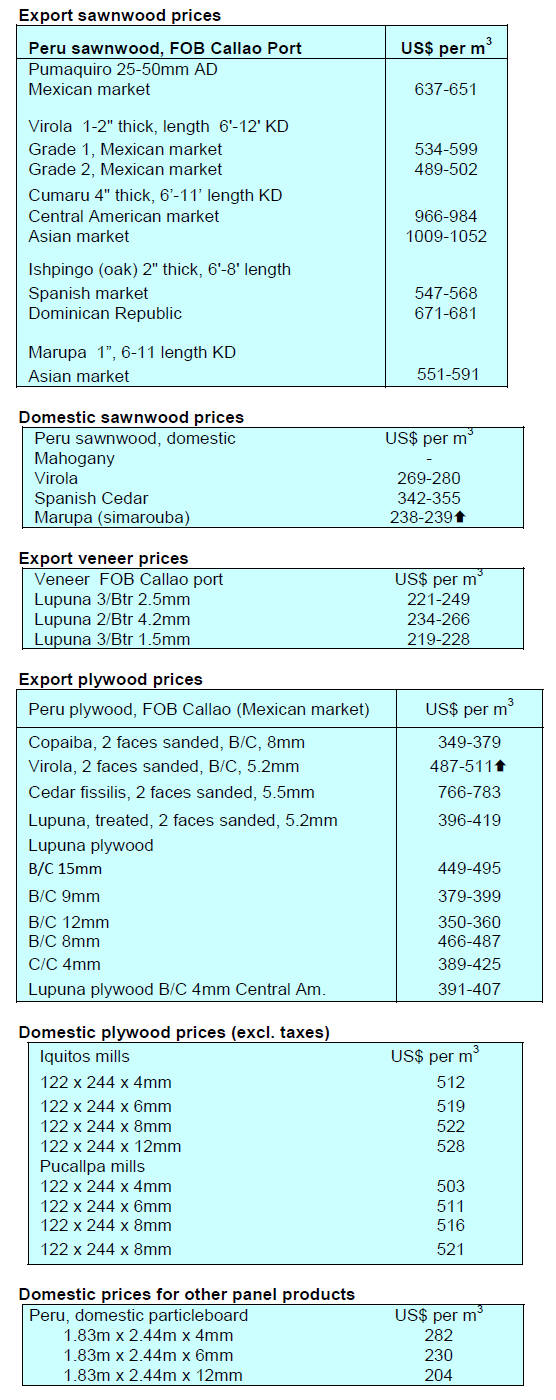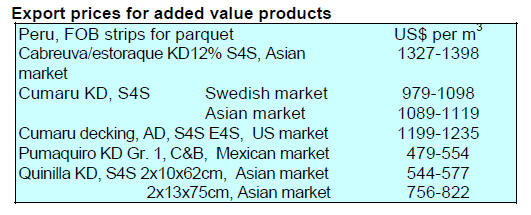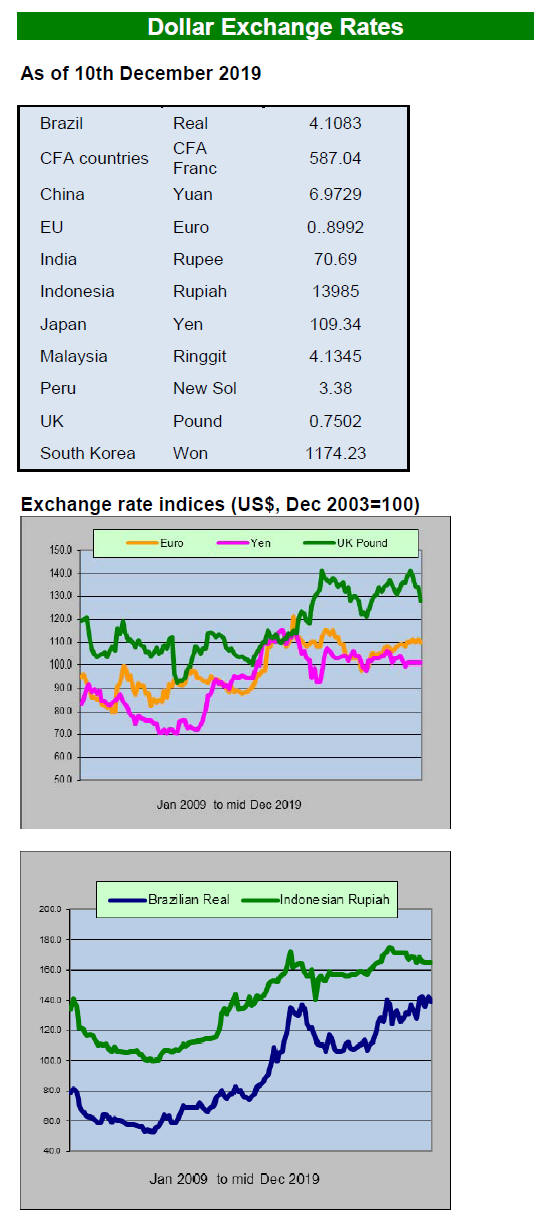3.
MALAYSIA
Malaysian furniture to penetrate
South Korean market
South Korea’s largest furniture exhibition, KOFURN
2019, the 2019 Korea International Furniture and Interior
Exhibition concluded recently. This was the 30th event
since the fair was first organised.
Given that ASEAN countries are major furniture
producers the ASEAN-Korea Centre (AKC) organised an
ASEAN Pavilion in KOFURN 2019 which exhibited
furniture and interior items from 84 companies in eight
ASEAN member states namely Indonesia, Lao PDR,
Malaysia, Myanmar, the Philippines, Singapore, Thailand
and Viet Nam. Ten Malaysian furniture companies were
invited.
The ASEAN/Korean Centre is an international
organisation established in March 2009 to increase trade,
accelerate investment flows, invigorate tourism and enrich
cultural exchanges between ASEAN member states and
South Korea.
Tenfold rise in forest fines proposed
A massive RM5mil fine is being proposed for those found
to have unlawful possession of forest products. The
maximum fine at the moment RM500,000. For trespassing
the government plans to increase the fine from RM10,000
to RM30,000.
Water, Land and Natural Resources Minister, Dr. Xavier
Jayakumar, said the proposed fines would be included in
the amendments to the National Forestry Act 1984. The
ministry had discussed the matter with several states and
the proposed amendments would be presented to
parliament. The changes would only be in effect in
Peninsula Malaysia as Sabah and Sarawak have their own
Forest Ordinances.
Advanced technology can boost Sabah furniture
production
Sabah is aggressively promoting automation and smart
manufacturing in the wood processing industries. Mohd.
Shafie Apdal, Sabah’s Chief Minister, said that advanced
technology for manufacturing can expand the output of
high value wood products while holding down costs.
The Chief Minister said research, development and
innovation can deliver highly competitive products for the
global market. Sabah has established about 226,000 ha. of
forest plantations of which around half are of high-value
commercial species. The plantation species include acacia
(66%), albizia falcataria (16%), rubber (11%) and teak
(4%).
Sarawak - No more oil palm plantations
The Sarawak Chief Minister, Abang Johari Tun Openg,
has announced a new land use policy under which the
Sarawak State Government will no longer approve new oil
palm plantations.
Read more:
https://www.theborneopost.com/2019/12/03/nomore-new-oil-palm-plantations-focus-is-on-conservingenvironment/
This move is in response to global concerns that
Sarawak
is allowing forest clearing for oil palm plantations. In a
recent meeting with officials from the EU the Chief
Minister explained the efforts being made to protect the
forest in Sarawak.
The EU Parliament recently adopted the ‘Delegated
Regulation’ under the European Union Renewable Energy
Directive II to effectively ban palm oil in biofuel by 2030
claiming cultivation has led to deforestation.
The Malaysian government has refuted this claim calling it
misleading and economically detrimental to the industry,
especially to the some 650,000 smallholders in the
country.
4.
INDONESIA
Monitoring timber production and
trade
The civil society organization, Jurnal Celebes recently
released a report "Strengthening Indonesia’s Independent
Forestry Monitoring Network to Ensure a Credible Timber
Legality Verification System (SVLK) and Effective VPA
Implementation".
Between October 2018 and December 2019, Jurnal
Celebes monitored the management, distribution and trade
of timber in the provinces of North Maluku, Central
Sulawesi and Southeast Sulawesi and in the provinces of
South Sulawesi and East Java.
Their report raises concerns related to forest harvesting
and extraction such as logging outside concession areas
and subsequent conflict with communities; selling wood
products obtained from outside concession areas and
undertaking harvesting without first conducting
environmental impact assessments.
The report also identifies infringements by companies
including misreporting timber species on transport
documents and loaning SVLK certificates to uncertified
businesses.
Commenting on the report, Stephen Rudgard, FAO
Representative of Indonesia, said the regulations should be
reviewed to provide for prosecution of illegal forestry
activities and there should be an expansion of joint
supervision between civil society and law enforcement
officials in the field to limit environmental impacts and
conflict with local communities.
The Environmental Advocacy Journalists Association or JURnaL
Celebes, consists of NGO activists and journalists in South
Sulawesi. The institution is committed to drive the process of
solving environmental problems, natural resource management
and social problems through mentoring and capacity building.
See:
https://en.tempo.co/read/1280041/recommendations-toimprove-legal-timber-production-and-trade
Indonesia seeks to learn from Vietnam’s success
The Indonesian Furniture and Crafts Industry Association
(HIMKI) recently visited furniture plants in Viet Nam to
understand how the furniture industry in Vietnam was able
to improve its exports in recent years. Also, as many
companies from China are relocating their factories to Viet
Nam, a HIMKI spokesperson said they want to understand
how Viet Nam supports incoming businesses.
Indonesia-South Korea trade worth US$20 billion
The Indonesian Ambassador to South Korea, Umar Hadi,
recently highlighted the increase in bilateral trade between
Indonesia and South Korea over the past five years.
In 2018 trade between the two countries was worth around
US$20 billion with Indonesia exporting some US$11
billion.
He noted that Indonesian products with potential to
penetrate South Korean markets include wood products,
food, beverages, processed seafood products, automotive
components and electrical items. He also referred to the
number of South Korean companies that have invested in
Indonesia.
Sengon residues in demand in South Korea
Sengon (the trade name for Paraserianthes falcataria)
processing waste such as sawdust and chips is in demand
in South Korea and one company in South Korea, Inakor,
imports both products from Indonesia.
Ari Satria, Director of Export Product Development in the
Ministry of Trade said, after visiting the South Korea
factory, that sengon sawdust can be used as animal
bedding while sengon chips can be used as a medium for
mushroom cultivation. Inakor has reportedly imported
around 48 containers of sengon residues last year.
Community forests urged to link with larger companies
Indonesia’s Minister of Cooperatives and SMEs, Teten
Masduki, has urged community forest owners and
managers to consider greater cooperation to raise their
competitiveness and open the way into the global value
chain. One of the support mechanisms being developed by
the ministry is for partnerships with large businesses.
Teten hopes that the community forest sector can generate
foreign exchange by establishing cooperatives and making
deals with larger companies as this could improve the
livelihood of remote communities and farmers.
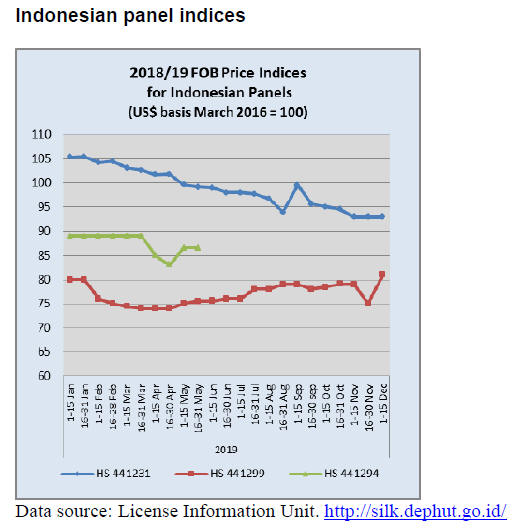
5. INDIA
Growth prospects dip for 2019-20
The Reserve Bank of India (RBI) revised GDP growth
down to 5% for 2019-20 from the 6.1% projected in
October 2019. At the same meeting the RBI kept the key
policy rate unchanged at 5.15% and decided to continue
easing efforts to support growth while ensuring that
inflation remains within the target set.
Markets had widely expected a sixth rate cut from the RBI
because of the slow growth in the Indian economy.
Smuggling attempt - Red sanders shipped as auto
parts
Indian police have broken a red sanders export smuggling
ring that used forged documents submitted to Customs
authorities and shipped around 58,000kg of red sanders
worth an estimate US$14 million over the last year. The
ring reportedly obtained the red sanders from the forests of
Andhra Pradesh and smuggled the timber to various
countries.
The illegally exported timber was declared as 'auto parts'
on Customs documents. The authorities said there is a
huge demand for red sanders in China and to avoid
detection the red sanders shipment was routed through
Malaysia, Dubai, Vietnam and Hong Kong from where it
was sent on to its final destination.
See:
http://timesofindia.indiatimes.com/articleshow/72080893.cms?utm_source=contentofinterest&utm_medium=text&utm_campaign=cppst
Developers see growth in ‘senior living space’ housing
market
The Indian residential market recovered modestly in 2018
after a disastrous 2017 with residential sales growing by
over 40% year on year and the recovery of sorts extended
into the first nine months of 2019 with sales increasing by
14% compared to the same period in 2018.
Despite the improvement sales do not match levels
achieved in the pre-demonetisation period which, say
analysts, indicates a growth potential that the residential
market has if consumer sentiments improves.
On the supply front, new projects have declined almost
10% year on year in the first three quarters of 2019 as
compared to the same period last year. The liquidity
crunch continues to hold back developers’ decisions to
launch new projects.
According to JLL Research, an increasing number of
developers are venturing into the senior living space of the
Indian real estate market. There has been a marked
increase in the number of senior living projects since
2010. It is estimated that the population above 60 years of
age in India will rise to approximately 170 million by
2025.
The report says “seniors are also evolving as a customer
segment and have demands different from seniors in
earlier times. A significant section of seniors today are
independent, financially stable, well-travelled, socially
connected and as a result, have well developed thoughts of
how they want to spend time after retirement.”
Since land prices in the major cities are very high senior
living has more potential in tier-2 cities where land prices
are lower.
See:https://www.jll.co.in/en/trends-and-insights/research/indiareal-estate-market-update-q3-2019-residential
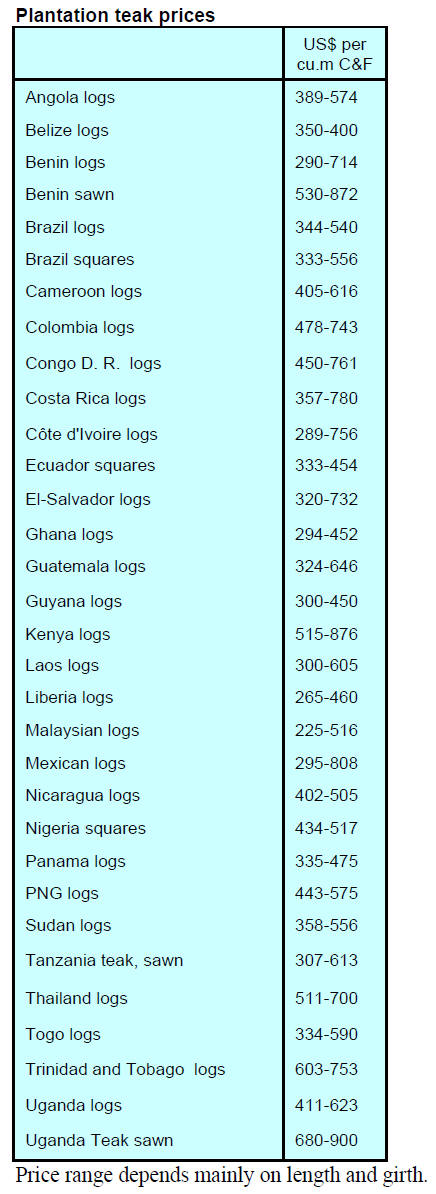
C&F prices for plantation teak landed at Indian
ports
continue within the same range as given earlier reflecting
the stable rupee/US dollar exchange rate. Analysts report
the GST Council is working on re-aligning the GST rates
and this news has buoyed the hopes of timber trade for a
reduction
Teak logs from Colombia
Recent offers of large size and good quality teak logs from
Colombia are in direct competition with teak from
Myanmar. Also, there have been several offers of good
size and quality teak from Nicaragua and Ghana.
However,with consumer demand being flat there have
been few contracts agreed.
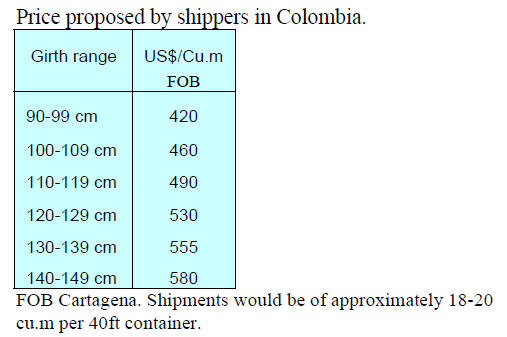
Locally sawn hardwood prices
Prices have been maintained as reported prevously.
Demand and import volumes remain well balanced.
Analysts sense a modest improvement in demand for
wood products and the government is trying to help the
manufacturing sector through tax adjustments. This, along
with news that GST rates may be adjusted, has been
welcomed by the timber industry. However, the rise in
demand for engineered wood products like WPC, MDF,
particleboard is undermining markets for solid wood in
many enduses.
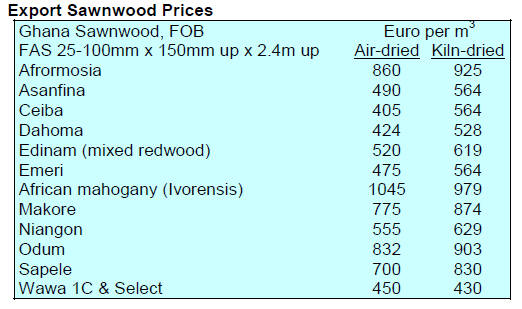
Myanmar teak prices
The availability of good quality hardwoods such as
merbau and iroko is impacting demand for Myanmar teak
in some enduses. Importers have mentioned that shipments
of teak from Myanmar are slow due to the conditions
prevailing there.
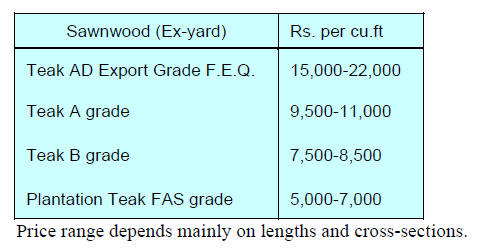
Sawn hardwood prices
Prices remain unchanged.
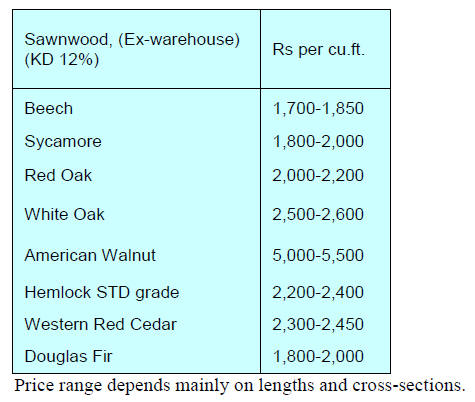
Plywood price increases
Container freight rates have risen pushing up the cost of
imported veneers, chemicals and logs. As a result of the
increased freight charges plywood manufacturers have
raised prices for plywood.
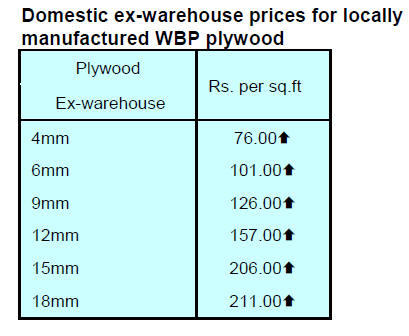
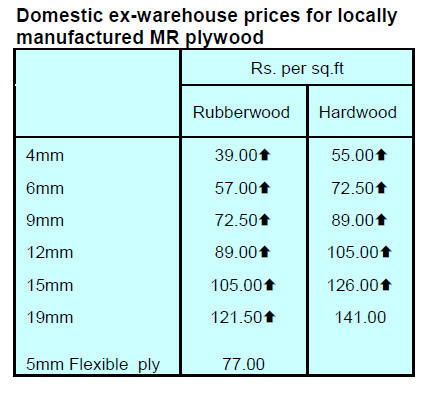
6.
VIETNAM
Be proactive to take advantage of
trade deals says
industry expert
Viet Nam has the opportunity to increase exports of wood
products to other Comprehensive and Progressive
Agreement for Trans-Pacific Partnership (CPTPP)
member countries . This was the message conveyed by
Nguyễn Thị Thu Trang, Director of the Viet Nam
Chamber of Commerce and Industry’s WTO and
Integration Centre.
To take full advantage of the opportunities said Nguyen
Thị Thu Trang the products must meet the CPTPP’s rules
of origin and conform with sanitary and phytosanitary
requirements and meet technical standards in the partner
country.
“If we do not meet their requirements, we cannot utilise
the preferential tariffs that CPTPP member countries offer
to us.”
Japan, Malaysia, Singapore, Australia, New Zealand and
Chile are countries that Viet Nam has bilateral or
multilateral FTAs with. The CPTPP creates another
preferential tariff scheme for businesses, who, depending
on which FTA offers more advantages, should choose that
to export under, she said.
“We export a lot to CPTPP member countries, but our
market share remains modest, for instance at 2-2.9 per cent
of their footwear imports and 0-6 per cent of garment and
textile imports.
There is still much more room for Vietnamese firms to
boost exports. “Canada, Mexico and Peru are countries
that Việt Nam does not have free trade agreement with,
thus CPTPP offers great opportunities for Vietnamese
firms to access these markets through preferential tariffs.”
Read more at
http://vietnamnews.vn/economy/569444/vnexporters-can-only-take-advantage-of-cptpp-withpreparation.html#q0yu6Vv5WVLuGMYA.99
More action on relabeling
Vietnam’s exporters have benefitted from the US/China
trade war and have been forced to address the issue of USbound
China made products being transported through its
territory to evade US tariffs as this threatens the reputation
of domestic manufacturers.
Recently the government prepared a list of products that
are reputedly at risk of re-routing from China through Viet
Nam.
In another bid to assuage US concerns of Chinese rerouting,
Viet Nam’s Ministry of Industry and Trade
announced it will suspend exports of some plywood goods
to the US from late December as it has been discovered
that products made in South Korea and Taiwan P.o.C have
been shipped to Viet Nam for minor processing before
being re-packaged and shipped as “Made in Vietnam”
products.
Is the rise of FDI in Viet Nam’s timber industry of
benefit or concerning?
Although FDI is seen as a key driving for the development
of the Vietnam’s wood processing sector some
government agencies have stressed that this also brings
many challenges and risks such as the illegal trade in raw
materials, unfair competition as well as socio-economic
negative impacts.
Dien Quang Hiep, Chairman of Binh Duong Timber
Association (BIFA) has pointed out that the rapid increase
of FDI in Vietnam’s wood processing sector especially by
Chinese enterprises has created fierce competition for
labour, raw materials and market share. There has also
been a rise in product origin fraud and price transferring.
This, said Dien Quang Hiep, requires attention to three
issues First, a nationally-wide review of all three types of
investment is required looking at new investments, capital
raising projects and business cooperation contracts.
Secondly, the national authorities should closely
coordinate with local timber associations to limit
‘informal’ investment arrangements and thirdly, the
Ministry of Industry and Trade and functional ministries,
government bodies should strengthen border control and
trade security.
The main countries investing in Viet Nam are China,
Japan and South Korea. By the end of September 2019,
Vietnam's wood processing industry attracted almost 70
new investment proposals worth over US$58 million. This
was around two and a half times higher than before the
beginning of the US/China trade dispute.
See:
https://haiquanonline.com.vn/vua-mung-vua-lo-khi-gia-tang-fdivao-nganh-go-117013.html
South Korea investigating dumping of plywood by Viet
Nam
In December the Korean Trade Commission announced an
anti-dumping investigation on plywood imported from
Vietnam. This came about as Korea’s domestic
manufacturers complained that imports from Viet Nam are
damage the domestic industry.
According to the Korean news agency, Vietnam's wood
products have a 40% market share in Korea, a market
worth around US$650 million.
It has been reported that the Korean Wood Production
Association is proposing an anti-dumping duty of 93.5%
on Vietnamese plywood in stark contrast to the antidumping
rate from 3.96% to 38.1% for plywood imported
from Malaysia and China.
See:
http://vietfores.org.vn/tin-tuc/han-quoc-dieu-tra-chong-banpha-gia-van-ep-nhap-tu-viet-nam/
7. BRAZIL
Not illegal but difficult to verify-
timber sector works to
reduce uncertainty
Entrepreneurs and representatives from five states in the
Amazon region (Acre, Amazonas, Mato Grosso, Pará and
Rondônia) attended the ‘First National Meeting of the
Forest Based Sector’ which was held in Cuiabá, Mato
Grosso. The aim of the meeting was to discuss issues
related the native species timber segment and to consider
strategies to improve the organisation of this sector
throughout the country.
The meeting was supported by the National Forum for
Forest-Based Activities (FNBF), with the support of the
Center for Timber Producers and Exporters of Mato
Grosso State (CIPEM).
The timber industry was unanimous in identifying
verification of legality as one of the main problems to
expanded trade in native timbers. This, it was agreed,
stems largely from the numerous and sometimes divergent
laws and regulations applied to the sector.
The meeting participants consider that the native timber
sector applies strict control and is subject to careful
monitoring but that there are legal provisions that open the
way for excessive and unwarranted scrutiny by public
officers and that this causes inconvenience and
undermines the business operations of those entrepreneurs
which are working diligently and obeying the law.
A representative from the Association of Timber
Industries Exporters of Para State (AIMEX) mentioned
that the company he represents is headquartered in Europe
and stated “We buy wood from Brazil and often receive
inquiries abroad about the legality of timber products.
Observing the sector's commitment to sustainable
production through forest management has been
satisfactory.”
Environmental Rural Registry – the basis for policy
decisions
In early December the director of the Brazilian Forest
Service (SFB) attended a board meeting of the
Parliamentary Agricultural Front (Frente Parlamentar da
Agropecuária - FPA) of the Lower House to present data
from the Environmental Rural Registry (CAR).
During the presentation, the director highlighted the
importance of the Rural Environmental Registry as an
effective tool in agribusiness and forestry planning and its
role in policy development, support programmes, projects
and activities for control, monitoring, environmental and
economic planning and combating illegal deforestation.
The SFB intends to provide the CAR platform to States
and the Federal District in early 2020 for updating and
based on the updated information it will be able to
properly plan public policies for sustainable development
of rural properties, combining productivity and
environmental conservation.
The president of the FPA, said "It is an opportune time to
bring together the Ministry of Agriculture, the Brazilian
Forest Service, the Brazilian Institute for Environment and
Renewable Natural Resources (IBAMA), the Chico
Mendes Institute for Biodiversity Conservation (ICMBio),
the National Institute of Colonization and Agricultural
Reform (INCRA) and the rest of the public sector to build
together the legal certainty that will ensure sustainability."
Furniture production on the rise
Furniture production in the state of Rio Grande do Sul was
8 million pieces in September 2019, up 4.8% compared to
the previous month according to Market Intelligence
Institute (IEMI).
In the year-to-September industrial production in the state
of Rio Grande do Sul grew 2.5% compared to the same
period of 2018. This was higher than that registered in the
national furniture industry over the same period. Over the
past 12 months the furniture industry expanded by 4.0% in
Rio Grande do Sul State while at a national level the sector
contracted.
In October 2019, furniture exports increased 1.6% and
were worth US$16 million. The three states in the
southern region, Santa Catarina, Rio Grande do Sul and
Paraná accounted for over 80% exports followed by the
State of São Paulo, with 14%.
The major markets for furniture exports from Rio Grande
do Sul State were the United States, 16%, Uruguay, 14%
and Peru, 12%. Exports to Argentina increased month on
month by over 45%.
Log export of native species under discussion
Media reports say the authorities in Brazil are considering
allowing the export of Amazon native tree species in log
form. The authorities are considering this after being
lobbied by timber businesses.
Current regulations establish that only exotic plantation
species such as eucalyptus and pine can be exported as
logs. The export of logs of native species is prohibited.
The current legislation requires that native timbers must be
processed in Brazil before export.
According to the Estadão newspaper the export of
roundwood of native species is being evaluated by the
Brazilian Institute for Environment and Renewable
Natural Resources (IBAMA). IBAMA, an agency under
the Ministry of the Environment (MMA), has already been
quizzed on this by representatives of the National Forum
for Forest-Based Activities, an organization made up of 24
institutions of the timber sector.
If the proposal for roundwood export is approved IBAMA
plans to recommend exports be limited to logs of native
species harvested in areas with sustainable management
plans.
See:
http://www.remade.com.br/noticias/16494/exportacao-dearvores-nativas-pode-ser-autorizada
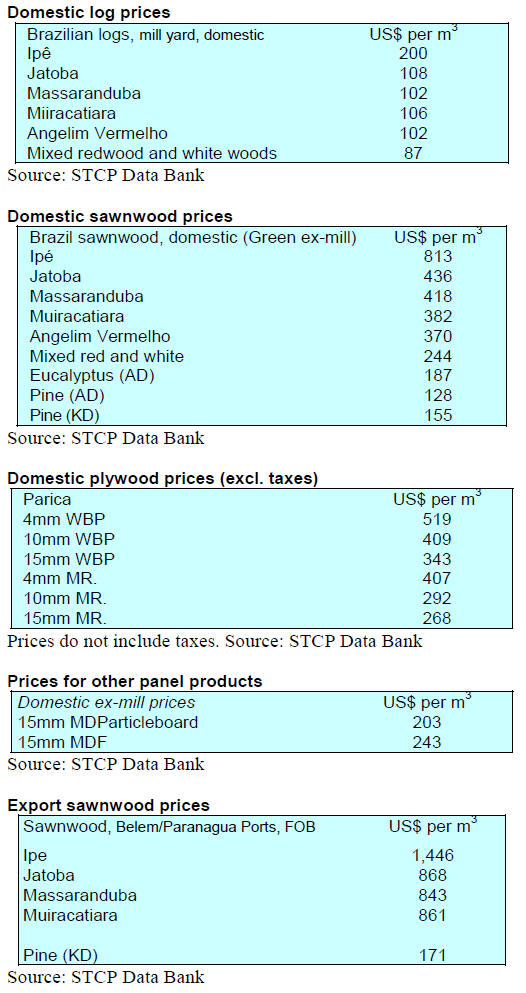
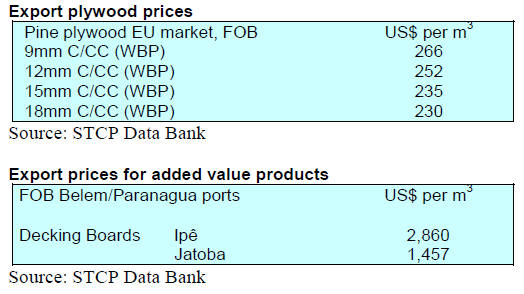
8. PERU
First three quarter 2019 exports
The Association of Exporters (ADEX) has reported that up
to September 2019 Peru’s timber exports were valued at
US$90.9 million FOB. This represents a 4% increase on
the same period in 2018.
Of the US$90.9 million exported China continued to be
the main export market with a 39% share, down slightly
from 2018. Mexico was the second ranked market
accounting for around 12% of exports and in Mexico
demand increased almost 8%.
Other significant markets included France (10%of exports)
up almost 50% year on year while in the case of the US
there was an almost 10% drop in the value of exports.
Sawnwood exports
Sawnwood exports in the first eight months of the year
were worth US$16.5 million FOB and much of this was
shipped to the Dominican Republic (35%) and Mexico
with 35% share.
Alliance to combat deforestation in the Peruvian
Amazon
Toyota’s office in Peru has announced an Alliance to
combat deforestation in the Peruvian Amazon. The Toyota
del Peru website has details and says:
“With the objective of contributing to the conservation and
protection of Amazonian forests, Toyota del Perú signed
an alliance with the Yamino native community and the
NGO Cima to carry out joint actions in favor of a more
sustainable Amazon and thus counteract the effect gases
greenhouse.”
The initiative includes joint actions to combat
deforestation caused by monoculture of oil palm and
illegal logging in the Cordillera Azul National Park,
Ucayali region, where the Yamino community is located.
Toyota del Perú acquired 900 carbon credits from the
Cordillera Azul National Park to compensate for the
ecological footprint of its operations, also contributing to
the preservation of this Amazonian forest.
Yehude Simon, Manager of Public Relations and Social
Responsibility at Toyota del Perú said Toyota is
committed to consolidating itself as an agent of change for
society, so the environmental issue is one of our
priorities. While Toyota has been promoting the use of
vehicles with hybrid technology in order to transform the
car into a more friendly one with the planet, we want to go
further and, therefore, we will work with other actors who
are committed to these objectives.”
Toyota explained that the strategy is to provide technical
and economic support for local families to develop
productive activities that promote eco-sustainable tourism
in the area, as well as enhance the production and
marketing of handicrafts and textiles representative of the
Kakataibo culture.
See:
https://www.toyotaperu.com.pe/noticias/toyota-delper%C3%BA-forma-alianza-para-frenar-la-tala-ilegal-en-laamazon%C3%ADa-peruana
Financial mechanisms for the forestry sector
The National Forest and Wildlife Service (SERFOR)
recently held a workshop on Sustainable Finance for the
Forestry Sector involving the participation of public and
private organisations from Guatemala, Colombia and
Costa Rica. The workshop aimed at exchanging
experiences and analysing financial mechanisms for
access to credit and forest investment as well as payments
for eco-system services.
The event was able to identify mechanisms, tools and
public policies that would help boost investment in forests
for sustainable production in the Peruvian Amazon which
minimise social and environmental risk levels.
Forestry delegation on technical exchange to US
Thirteen public servants, researchers, teachers and
representatives of the private forestry sector recently
participated in an exchange visit to Oregon and Wisconsin.
The aim was to gain experience of the United States Forest
Service model for forest research management and its
articulation to the private sector.
The Peruvian delegation was made up of members of
SERFOR; the National Council of Science, Technology
and Technological Innovation (CONCYTEC); the
Technological Institute of Production-CITE Forestal
Maynas; the National Institute of Agrarian Innovation
(INIA); the Forest Executive Board of the Ministry of
Economy and Finance; the National Agrarian University
La Molina (UNALM); the National University of the
Peruvian Amazon (UNAP); and a private sector
representative.
This visit was conducted with the technical support of the
USAID FOREST program and the United States Forest
Service in collaboration with Oregon State University
(OSU).
